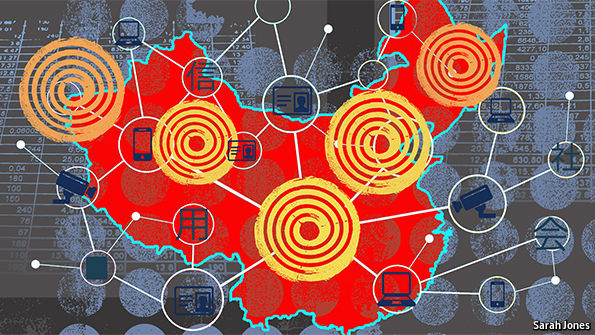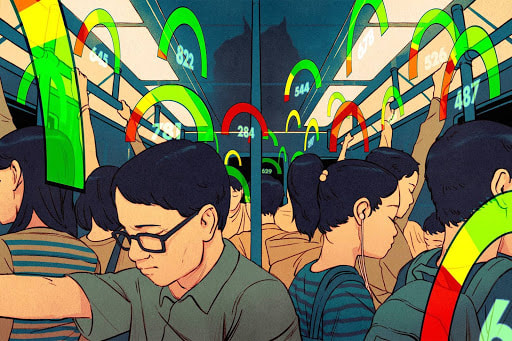|
by Priya Bhanot Edited by Jonah Boardman  Source: https://www.economist.com/briefing/2016/12/17/china-invents-the-digital-totalitarian-state Source: https://www.economist.com/briefing/2016/12/17/china-invents-the-digital-totalitarian-state Black Mirror -- one of Netflix’s most popular originals that explores the consequences of futuristic technology -- released an episode titled “Nosedive,” in which a young woman navigates a world dependent on social rankings. With an easy-to-follow storyline, great graphics, and interesting tech, it has the perfect elements for a mind-twisting thought experiment. At first, it may seem like an interesting take on social media and the pervasive modern tendency to value appearance over substance. More deeply, though, it grapples with the question of whether actions, relationships, networks, and, finally, people can be reduced to a single number. Perhaps what is most thought provoking, though, is that this one episode of a TV show is more widely recognizable (at least in my social circles) than the real world implementation of this exact same system. In 2012, President Xi of China published his plans for an all-encompassing social ranking system, including the installation of over 200 million cameras nationwide to track and judge his citizens. The digital era of instant communication and global networks has exponentially catalyzed the access to information for the average consumer. However, the modern age of streamlining presents new threats to individual privacy, with the Communist Party of China (CPC) led by President Xi testing the capacity of technology to increase governmental social control. Advances like artificial intelligence, facial recognition, large data set processing, and online blacklisting afford the Chinese government -- and every other first-world government -- the power to maintain a close watch on individual citizens and their actions without very much effort. In 2014, President Xi announced his next step in establishing a formidable centralizing government through his “fourth magic weapon”: the Social Credit System (SCS). The SCS has garnered international attention for its extremism. But while the western world condemns China’s invasion of its people’s privacy, it is hardly the first example of electronic social control in China. In fact, the SCS is a part of a much larger agenda, the implications of which may prove to set a global tone for this this new age of technology and the authority that controls it. More specifically, President Xi’s SCS may be an example of infrastructure other governments can use to monitor the digital and concrete lives of its citizens. With the SCS set to be fully active in 2020, China has released smaller pilots of the program in various regions to amass data about this new initiative. Like something straight out of Orwell’s 1984, the Social Credit System (SCS) will analyze the behavior of Chinese citizens captured through police reports, purchase receipts, online activity, community feedback, “grid systems” (land divisions monitored by specific committee that reports the actions of citizens in that sect to the government), and footage from cameras all across China. Those raising families, supporting the communist regime, or donating to charity, will raise their social credit scores. In contrast, those observed posting excessively online, purchasing video games instead of diapers, or littering will decrease their scores. Citizens with higher scores will have access to perks like free hotel room upgrades or discounted flights, while those with lower scores could be penalized with slower internet or higher bills. And unlike credit score in the US, these scores will not be kept private. People with sufficiently low scores will be blacklisted on a public platform by insurance companies, banks, potential employers, or even from friends. The model for the SCS is not as foreign to democratic onlookers as it may seem. Credit score and public ratings on apps like Uber or Ebay all operate with the same inherent premise of the SCS -- even the parts of the program that seem most Black Mirror-esque. While it may seem easy to criticize the idea of assigning a numerical score to a person’s interests and behaviors, and using it to decide their quality of life, some argue that it’s necessary in a world with instant global communication. For the first time in human history, we are always connected to strangers across the world. Could President Xi’s SCS be a useful tool for building trust between strangers? After all, would you put your life in the hands of a random person if Uber gave you no information about them? Although severe, President Xi’s SCS is precedented by similarly restrictive constraints on the digital freedom of the Chinese people. For years, the Chinese government has been editing the information available to its citizens in order to further its political agenda. As a result, the perception and role of the internet in China is slightly different than in the rest of the world. Since the government controls the influx of information, people do not commonly rely on it. Instead, it has become a center for entertainment, with social media in particular dominating its use. But what does China’s digital totalitarianism mean for the rest of the world? Does President Xi have the power to set a precedent for the assimilation of smart technology in everyday life? The answers are not certain, although there are definitive clues to how this new technology may be perceived by other countries. China’s use of the internet for social control is nothing new. Edward Snowden and other whistleblowers clearly highlighted the hypocrisy of the Western distate for the CPC’s plan. Tech giants like Facebook and Google are already in conversation with the CPC about how to “cash in” on this nationwide surveillance using their innovations and algorithms. Given the Russian Facebook scandal earlier this year, would it really be too much of a stretch to assume these companies might use CPC technology to surveil all of their consumers? Data is currency nowadays, and there seems to be no way to avoid that reality. The real question is whether we should be worried. Works Cited:
Parton, Charles. "The fourth weapon: Social credit is just one part of the new state control." Spectator, November 17, 2018, 13+. General OneFile (accessed January 22, 2019). http://link.galegroup.com/apps/doc/A562973833/GPS?u=palo88030&sid=GPS&xid=55b0b9fa. Xiao Qiang. "The Road to Digital Unfreedom: President Xi's Surveillance State." Journal of Democracy 30, no. 1 (2019): 53-67. https://muse.jhu.edu/ (accessed January 30, 2019). https://muse.jhu.edu/article/713722 "Creating a digital totalitarian state; China's social-credit system." The Economist, December 17, 2016,20(US). General OneFile (accessed February 25, 2019).http://link.galegroup.com/apps/doc/A473976724/GPS?u=palo88030&sid=GPS&xid=891f48c1
1 Comment
Xiangming Zhao
8/3/2020 06:27:17 am
Thanks for raising such an important question! The danger in any SCS-like system lies in the ownership of data and the design of algorithm. If such a danger can be avoided through public participation, design, discussion, such a credit system would be a powerful stimulus of "good deeds" in social virtue system. Before that, it is at high risk of totalitarianism.
Reply
Leave a Reply. |

